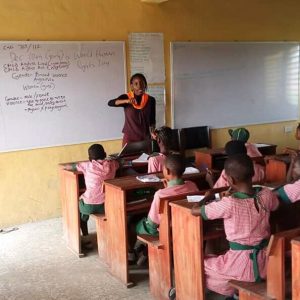In commemoration of the 16 Days of Activism against Gender-Based Violence (GBV), SPACES FOR CHANGE | S4C joined the human rights community in Nigeria and other parts of the world to promote awareness on gender-based violence to young girls and boys in Lagos schools. 16 Days of Activism against GBV is an international campaign that kicks off on November 25 and ends of December 10 every year, advocating for the elimination of all forms of violence against women and girls.
Between January to August 2018, the Lagos State Domestic and Sexual Violence Response Team (DSVRT) received 3,089 reported cases of domestic and gender-based violence including child abuse. This alarming figure is two times higher than the previous year’s record of 1044 cases for the entire 2017 year. As part of efforts to check the surging menace of GBV in the state, S4C took the awareness campaign to public and private schools in Lagos State, in order to empower young girls in particular to speak up and report any violence or discrimination that they encounter and demand justice for the violation of their rights.
S4C’s campaign targeted young girls schooling in the informal communities who face higher risks of violent attacks because their families face recurrent forced evictions and consequently, are forced to sleep in the open and in unsafe places. At St. Claire’s Model Academy, Ikeja and Ajeromi Primary School Apapa, Lagos State, over fifty pupils and their teachers learnt about the fundamental rights and freedoms guaranteed under the 1999 Nigerian Constitution, and further protected under the Child Rights Act. They also learned about the various mechanisms and agencies within the state where acts of violence can be safely reported.
Gender-based violence can take place anywhere: in the home, in the school, at the playground, in the place of worship, in the community, anywhere. In the schools, it can take the form of punching, hitting, indiscriminate touching, caning, slapping, exploitative labor by higher authority, excessive exercise drills and corporal punishment. More often than not, it is the female child who is at greater risk or vulnerable to acts of gender-based violence, no thanks to the deeply-entrenched gender discriminatory norms and unequal balance of power between women and men in the society. Gender-based violence within the school setting is very dangerous to a child’s education and can inhibit a child’s willingness to go to school. If not properly prevented or addressed, schools can reinforce harmful gender norms in classroom environments.
At the close of the enlightenment sessions, S4C urged the school authorities to establish anonymous reporting systems, like suggestion boxes or institute “tell an adult” mechanisms that encourage students to report potential problems and personal encounters of violence to credible school officials. In addition, schools need to develop clear codes of conduct and ethical guidelines and take further steps to ensure all pupils are aware of what constitutes unacceptable behavior, and understand how to report it. School children also learned about toll free channels and hotlines like 767 and 112 belonging to the Lagos State Emergency Response Units where victims can report to, and receive help swiftly for cases of rape, defilement, domestic violence, child abuse, neglect maltreatment and other sexual assaults. The session ended with the free distribution of the Child Rights Act to all pupils in the two schools.





















